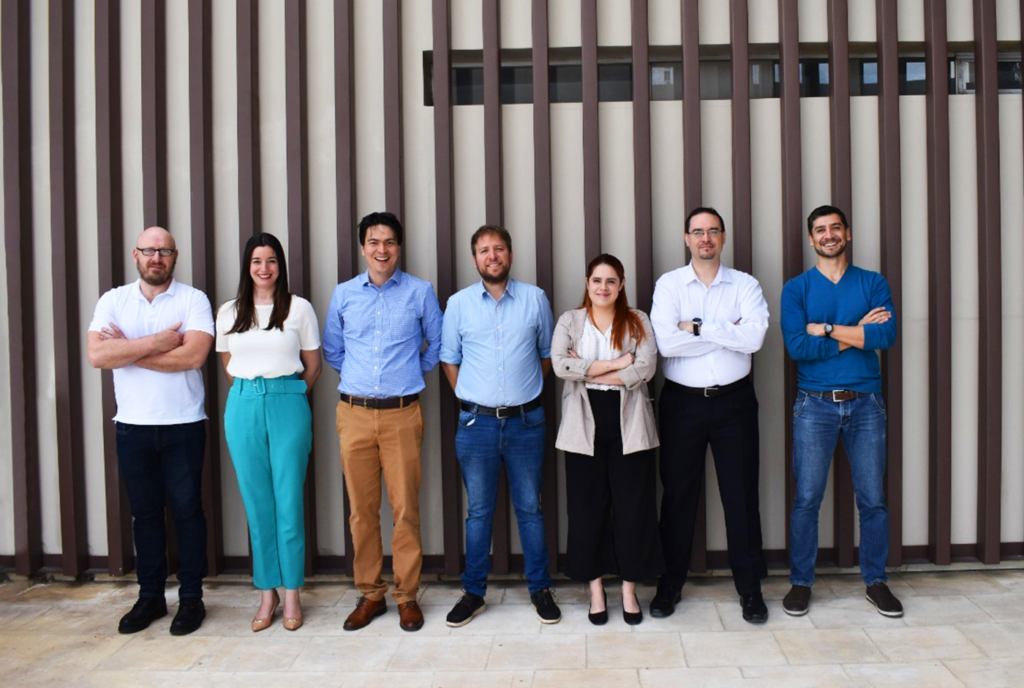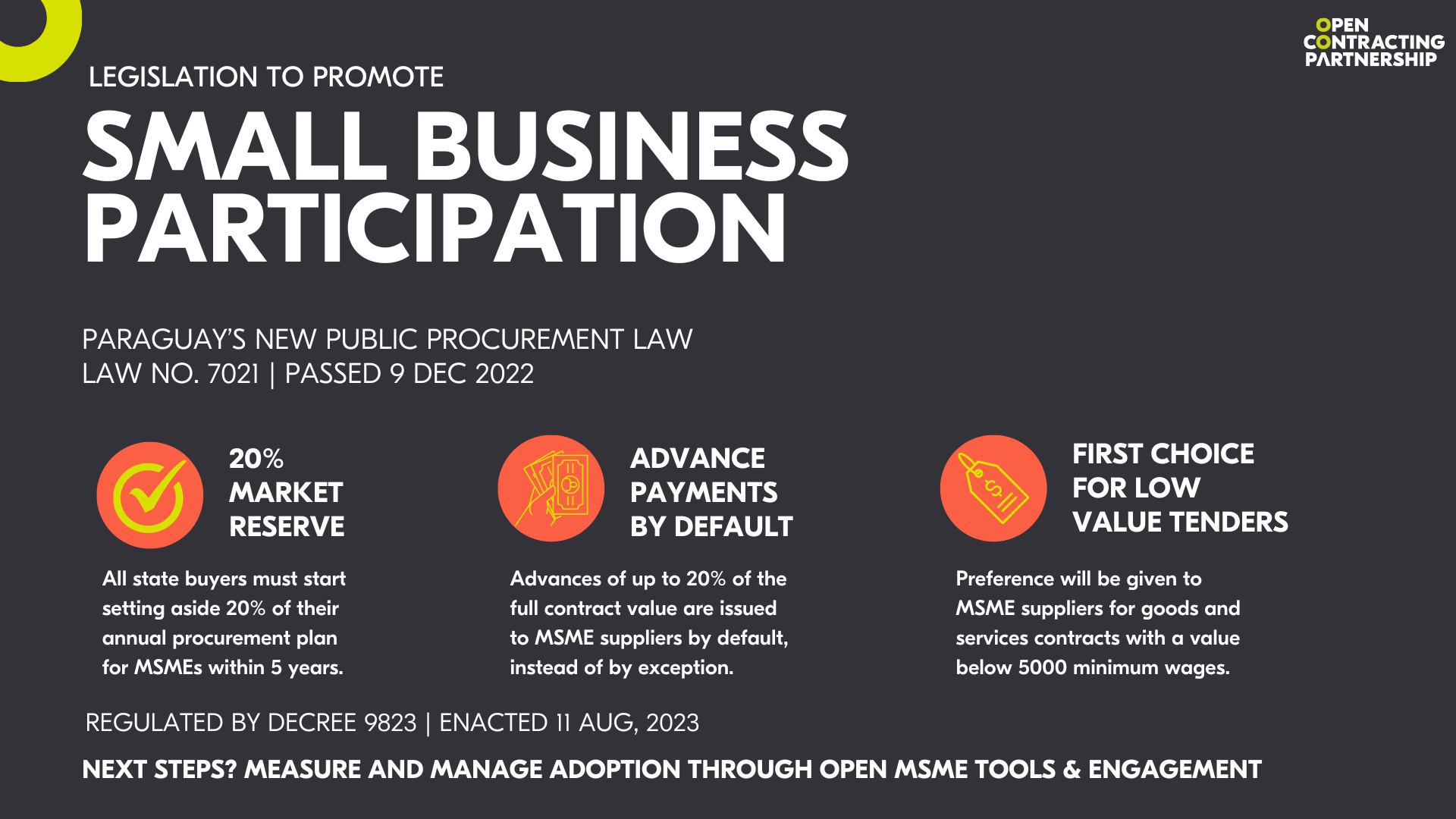Paraguay’s procurement is open for small business

Challenge: Less than 9% of the money spent on public contracting in Paraguay is awarded to micro, small, and medium enterprises (MSMEs), despite these businesses representing about 95% of commerce in the country.
Open contracting approach: With the support of OCP’s Lift accelerator program, a team of representatives from Paraguay’s government, civil society, and the private sector worked to increase participation of MSMEs in the procurement market. They leveraged Paraguay’s high quality, publicly accessible open contracting data to measure the existing participation of these smaller businesses and to understand their challenges in working with government buyers. The team developed a three-pronged strategy:
- talk to MSMEs and build their capacity to bid on contracts;
- simplify the bidding process for smaller businesses; and
- use innovative technology to better measure and manage opportunities for small business vendors.
The work also informed new legislation that will require 20% of the value of contracts to be awarded to MSMEs, including through subcontracting.
Results: A year after the new procurement law was passed, the public procurement agency (DNCP) is using machine-learning to identify tenders that are most likely to be awarded to smaller businesses. MSMEs can search for these “small-business-friendly” opportunities on a dedicated microsite, which also includes a training course to help them navigate the process of participating in government contracting. Upgrades to the DNCP’s open data incorporating this MSME classification have allowed third-party services to emerge, like the platform VIGIA, which suppliers can use to monitor tenders in real-time and report any concerns or anti-competitive behavior to authorities. While it’s too early to see system-wide changes, open data analyzed by OCP shows signs that participation by smaller businesses has steadily increased since the reforms started. By end of 2023, nearly half of all tenders were tagged with the new “suitable for MSMEs” label (introduced as part of the Lift project), and around one in four of these procedures were awarded to an MSME.
From the fourth quarter of 2021 to the fourth quarter of 2023:
- the share of bids by MSMEs in all procurement categories rose by almost 9pp (from 15% to 24%);
- the share of unique MSME bidders rose by more than 7 pp (from 10% to 18%);
- the share of contracts awarded to MSMEs rose by 8.5 pp (from 13% to 22%);
- the share of procedures with at least one bid by an MSME rose nearly 14 pp (from 30% to 44%);
- the share of the value awarded to MSMEs almost doubled, from 2.6% to 4.9%.
Uncovering new opportunities
Paraguay has a thriving small business sector. But despite dominating the economy, micro, small, and medium-sized enterprises (MSMEs) account for only a fraction of spending on public contracting — estimates vary from 8.9% to as little as 1.7%, depending on the calculation method and source data. Fewer than 300 MSMEs participate in a procurement market worth almost US$3 billion annually. In comparison, Paraguay’s industry association for entrepreneurs and small businesses, ASEPY, has 6000 members.
“MSMEs are an important driver in the distribution of wealth in a region,” observes Juan Pane, a data scientist and long-time champion of open contracting, whose organization Center for Sustainable Development (CDS) is a member of ASEPY.
“Given their local nature, and that they normally hire locally, they are a vehicle for wealth to be distributed quickly and without many intermediaries, they normally pay their contractors and suppliers faster in relation to large companies.”
But the pandemic brought many of these businesses to a standstill.
“Governments were one of the few actors that were not affected in their spending processes, compared to private sector companies, the vast majority of whom stopped their operations, leading to a paralysis of the economy,” Pane says.
“Given that governments do not have many policies that effectively enable public purchasing by MSMEs, there was an enormous opportunity for public contracting to be a vehicle that allowed MSMEs to continue operating, accelerating the distribution of money at a time when little money was in circulation.”
In 2021, Pane and a team of representatives from Paraguay’s government, civil society and the private sector joined OCP’s Lift impact accelerator program, with the aim of increasing the participation of MSMEs in public procurement.

They tried to set the project up for success in three ways.
Firstly, they gathered the three key public procurement actors in the same team and aligned on the same vision. The Lift team had members from the government, represented by Paraguay’s national procurement agency (Dirección Nacional de Contrataciones Públicas or DNCP); civil society, represented by ASEPY; and the private sector, represented by CDS.
With this composition, the group could quickly identify the problems affecting MSMEs, devise measures to mitigate them, and crucially, had the authority and right technical, policy and legal expertise to implement these changes in the public procurement market.
Second, they sought to leverage Paraguay’s accessible, high quality open contracting data. The database has more than 400 fields, published in the internationally recognized Open Contracting Data Standard (OCDS) format and covering all stages of the contracting cycle. Accessible via API and user-friendly visualizations, the data is updated every 15 minutes, and improvements are made to it continuously.
Finally, DNCP is an “island of excellence” within a more challenging government apparatus. DNCP has an excellent reputation, a readiness to engage external stakeholders, and a strong performance-driven data culture. This has led to a number of innovations that could also be leveraged for the project including :
- FOCO, a system for civic monitoring of investments in the education sector, run by the youth-led organization, reAcción;
- VIGIA, a supplier-focused platform created by the entrepreneurs’ association, ASEPY;
- ControlCiudadano, a collaborative project for researching the profiles and assets of elected officials and suppliers, as well as COVID-19 spending;
- MapaInversiones (Investment Map), an infrastructure platform jointly developed with the Inter-American Development Bank.
Legislation and institutionalization
As the reform team was working together through the Lift program, their discussions also fed into a new public procurement law. The Lift team’s research and evidence on the challenges faced by MSMEs were fed into that process and members of the team were part of the drafting process. The new law that was passed on December 9, 2022 with more details added in the subsequent decree that regulates its implementation.

One key recommendation was to require government buyers to pay advances to MSME suppliers at 20% of the full contract value.
“The internal flow of money of MSMEs has a different dynamic than that of large companies,” says Martha Arriola Afara, Executive Director of ASEPY. “An MSME in Paraguay might barely be in the financial position to wait for the state’s payment, as this can arrive 30 or more days after the contract is awarded. So, it is essential that these companies can have advance payment to carry out the service in a timely manner and not go bankrupt in the process.”
The law also mandates government buyers to reserve 20% of their procurement for MSMEs in their annual procurement plans, with a five year grace period for adoption.
The new government, elected in August 2023, continues to champion the successful implementation of these reforms.
DNCP Director Dr Agustín Encina Pérez says: “The trend shown by the data is very positive, which indicates that the projects and changes we are making in terms of contracting are the right ones.”
“We have important challenges ahead around the implementation of the Suministros y Compras Públicas law. We are sure that thanks to the committed and capable team we have at the DNCP we will take the performance of public procurement to a new level,” he adds.
The Lift team developed a three-pronged strategy for the reform: talk to MSMEs and build their capacity to bid on contracts; simplify the bidding process for smaller businesses; and use innovative technology to better measure and manage opportunities for small business vendors.
1. Outreach and capacity building among SMEs
MSME survey: In November 2021, the Lift team commissioned research to understand the current experiences of small businesses interacting with the procurement market. The survey examined historical data of transactions from the official procurement system, and assessed the perceptions and knowledge of MSMEs about the business opportunities available to them. A key insight was that entrepreneurs didn’t know much about government contracting. Of those surveyed, 59% were not aware of the system. But most (74%) of that group wanted to know more and receive training on participating in procurement.
Mentoring: Based on the survey finding that many ASEPY members were unaware of procurement opportunities but wished to know more, the Lift team decided to pilot a mentoring program to connect aspiring MSME vendors with experienced government contractors. Launched in May 2022, the goal of this pilot was to understand the feasibility of scaling such an initiative, but it also helped identify obstacles faced by suppliers in practice. For example, many of the entrepreneurs were unaware of the process for obtaining permits, licenses, registrations, and general tax and social security requirements specific to their field until their first bidding experience. Other barriers included requirements that demanded a high level of experience and meeting certain criteria to prove their financial sustainability. As a result, guidance on how best to handle such barriers and criteria was added to DNCP’s training resources and courses to encourage buyers to design contracting processes more suitable for MSMEs.
Government training: Training for potential suppliers was enriched by the collaboration between the DNCP and ASEPY, as they could provide recommendations, each from their own perspective, to address common skills and knowledge gaps (such as this webinar).
2. An easier process for SME
Advances for MSMEs: Since May 2023, MSMEs awarded contracts can collect an advance of up to 20% of the total contract value. While there were provisions for issuing advances previously under the Budget Law, their use had to be justified. In contrast, under the new rules, advances must be granted by default, unless there is a reasonable justification for why this mechanism is not used.
End of the “Small Certification”: According to the research commissioned by the Lift team in November 2021, MSMEs said they did not have the small-business certification, a bureaucratic document that had to be obtained from the DNCP to access certain advantages as a government supplier. This was a separate process to registering as a small business more generally with the Ministry of Economy. There was no mechanism at the time that allowed the two entities to share this information internally, so the onus was on the business to submit their paperwork twice. In September 2022, the process was adjusted so businesses now only need to apply for the MSME status once and they can do it online.
Manual on simplifying tendering for SMEs: This guide helps government buyers design procurement processes that are more friendly to small businesses. Published in October 2022 and developed in conjunction with the Lift team, the manual recommends using a variety of strategies to promote participation, such as establishing standardized selection criteria to build confidence among potential bidders, or using dedicated communication channels to provide feedback to bidders. Other recommendations include publishing the call for proposals for a longer period, or reserving a market share for MSMEs when possible and relevant, or writing clearer and more detailed specifications.
3. Making technology work for SMEs
Optimized search engine for SMEs: Machine learning techniques, developed by CDS, are being used to identify the characteristics of tenders that are suitable for MSMEs. From the start, these calculations were to be used for a very practical purpose: to help DNCP predict which upcoming tenders were appropriate for small businesses and automatically flag them in the public procurement portal, so that vendors could easily find the tenders they had the best chance of winning.
The training used two models and a DNCP dataset representing more than 200,000 procurement lots from 2010 to 2022. Both models, classification and clustering, are described in more detail in this CDS report.
To run the calculations on the DNCP public procurement portal, a service layer was developed that integrates both models and allows predictive analysis on every single procurement procedure that appears in the system.
MSME Microsite, A ‘One-Stop’ Shopping Portal: Launched in May 2023, this portal is designed to be a central hub where SMEs can search for upcoming opportunities, access a 10-module online training course and browse other important documents for participating in the procurement market. The portal also aims to meet user needs identified through the research with MSMEs, and provides information about all the work carried out through the Lift project.
OCDS Data Improvement: The “suitable for SME” classification for contracting procedures is reflected in the DNCP’s open contracting data, using an extension of the OCDS developed in the UK:
Adding this tag to the open data means it can be used in other third-party projects, such as VIGIA, which has its own search engine for tenders just for small businesses.
Results
For Juan Ardissone, then the DNCP’s Director of Information Technology and now Paraguay’s Vice Minister of Technology, the Lift project was valuable for engaging with a group that had long been important to the procurement agency but had been hard to reach.
“MSMEs were always very important for the DNCP, but it was always very difficult to create tools for them. So that is where I believe that the work with OCP and the collaboration helped a lot. We could create a tool that effectively serves MSMEs and us as well, because finally,
by creating that [small-business-friendly label], we could start monitoring [an indicator] we did not have before because we had no way of identifying it. And of course, it also helps provide feedback for new projects and new tools that we can create based on the analysis now from the set of tenders that are already marked.”
ASEPY’s Martha Arriola says the Lift program was fundamental for putting small businesses on the agenda of the DNCP, contracting authorities and other organizations that participated in the process. “[It clarified] where MSMEs were at that time, as well as the main challenges that existed and had been invisible to the vast majority,” says ASEPY’s Arriola.
While it’s too early to see system-wide changes, open data analyzed by OCP shows signs that participation by smaller businesses is increasing. Our analysis considers the data in two ways: a) the 18-month period before the Lift program reform started (January 2021 to June 2022) and the 18-month period after (July 2022 to December 2023); and b) year-on-year figures for the most recent quarter (Q4 2023) at the time this article was published.
Pre- and post-reform periods:
- In the 18-month period before the Lift reform started, 13.5% of bids were submitted by MSMEs, compared to 19.2% after;
- The share of unique MSME bidders increased from 6.8% to 10.9%;
- Procedures with at least one MSME bidder accounted for 28.2% and increased to 36.1%
- The share of awards to MSMEs rose from 11.6% to 16.9%
- The share of the total value awarded to MSMEs grew from 1.7% to 2.4%
- The new “suitable for SME” tag was introduced in late 2022
Year-on-year changes:
- The share of awards to MSMEs reached 21.6% in Q4 2023, compared to 13.1% in Q4 2021 and 13.7% in Q4 2022.
- The share of bids by MSMEs increased to 24% in Q4 2023, from 15.1% in Q4 2021 and 15.4% in Q4 2022.
- The share of unique MSMEs bidders rose to 17.7% in Q4 2023, up from 10.4% in Q4 2021 and 10.9% in Q4 2022.
- The share of procedures with at least one MSME bidder grew to 44.2% in Q4 2023, from 30.3% in Q4 2021 and 29% in Q4 2022.
- The total value awarded has increased from 2.6% in Q4 2021 and 1.2% in Q4 2022 to 4.9% in Q4 2023.
As of Q4 2023, 43% of tenders were tagged with the new “suitable for SME” tag, and 26% of these procedures were awarded to an MSME.
















What’s next
Paraguay faces an ambitious task in implementing the new procurement law, not in the least because some smaller businesses are still wary about a market that has been inaccessible to them until recently.
“We have noticed more interest on the part of MSMEs in the procurement market. Since these reforms, they see it as a more ‘possible’ market, but still with a lot of fear and [caution],” says ASEPY’s Martha Arriola. “We must work more to make MSMEs aware of these new measures, and make them understand the great opportunity that exists today.”
The new small-business-friendly tools will be a major asset for those managing and measuring the law’s implementation, especially the new DNCP microsite, and the supplier-led monitoring platform VIGIA.
It is early days, but with economic recovery a major concern for governments worldwide, the Lift reformers in Paraguay are demonstrating how better procurement could play a key role in economic recovery and more equitable economic opportunities across the continent even in uncertain times.